- Home
- Troy Denning
Last Light Page 16
Last Light Read online
Page 16
“Doesn’t matter—the support squad should be here,” Fred said. When he and his squad reached ten hours overdue, escort protocol would have dictated that Kelly and the other Spartans evacuate their charges under heavy protection. But it also mandated that they leave behind a supply cache and a three-person support team, then return to initiate a search as soon as possible. “And Kelly should be back with the rest of Blue Team and a search party by now.”
“Right,” Lopis scoffed. “Because it’s so easy to keep a schedule down here.”
Fred started to reply that Spartans were expected to meet their schedules, then recalled that on the way out of the cave, Kelly and her squad would only be able to move as fast as the GMoP techs they were escorting. Given the long climb to the surface and the likely exhaustion of the civilians, it was entirely possible they hadn’t even made it back to Wendosa yet, much less Battalion HQ.
“Fair enough,” Fred said. “But that still doesn’t explain a missing support squad. Ash, move us out to a secure position where we can leave Inspector Lopis and Olivia.”
“And you two are going where?” Lopis demanded.
“To reconnoiter.”
“Isn’t that what Mark is supposed to be doing?”
“Mark’s not in contact right now,” Fred said. “That’s why Ash and I need to reconnoiter.”
“ ‘Not in contact,’ ” Lopis echoed. “Have you lost control of him already?”
Before Fred could reply, Ash started to crawl forward, drawing the litter along and forcing Lopis to follow. Fred signaled his gratitude by sending Ash a green status flash. The inspector had been asking a lot of unpleasant questions about Mark, Smoothers, and Gamma Company brain mutations, and Fred didn’t have time right now to explain why he didn’t think Mark could be the killer—especially since Lopis was unlikely to accept because I know him for an answer.
In the vast chamber that contained Crime Scene India, a “secure position” turned out to be a muddy niche about a meter high and two meters wide, tucked in behind a jagged fence of stalagmites. The niche was recessed into the cave wall, so there was no need to worry about an enemy sneaking up from behind. But the low ceiling and lack of an easy escape made Veta feel trapped and jumpy, and she found herself staring out into the unrelieved darkness with the same sense of dread she had once experienced in the pitch blackness of a hidden cellar, listening for the whisper of boot soles on stone the same way she had once listened for the clack of a rising latch.
Here she heard only water: the solitary plink of a stalactite releasing a droplet into a nearby pool . . . the trickle of a rivulet descending a stony slope . . . the distant hiss of a cascade plummeting into a bottomless pit. It was maddening, a slow torture that made Veta’s chest tighten in fear.
“Breathe.”
The whispered word came from the darkness next to Veta, where Olivia lay on her belly, holding the M7 SMG and peering out into the cavern’s vast blackness. The young Spartan was still unable to walk comfortably, but under the Huragok’s care, her broken femurs had mended enough to bear her weight, and if she was in pain, her whisper did not betray it.
“In through your nose, hold, out through your nose,” Olivia continued softly. “Slow and natural. It’ll calm you.”
“Who says I need calming?”
“Your body does,” Olivia said. “You keep forgetting to breathe, then you draw air in so hard that I can hear you. And there’s a bitter tang to your odor.”
“Yeah, well, neither of us smells so great,” Veta said. “We haven’t showered in days.”
Olivia’s voice sharpened to a hiss. “This is no joke, Inspector. You need to steady yourself. If something happens, you won’t be able to hit a thing.”
Veta started to ask why Olivia expected trouble, then realized how foolish that would have sounded. In the Spartan’s world, the key to survival was readiness and teamwork—and at the moment, Veta was hardly prepared for the unexpected, and she was certainly not someone who could be counted on during a fight.
“Sorry.” Veta began to pay more attention to her breathing. “I have a problem with tight spaces.”
“Ah.” Olivia fell silent. For a moment, it seemed like she was probably thinking something unkind, but then she said, “You’ll be fine. We all have things like that.”
Veta smiled into the darkness. “Sure you do.”
“No, really,” Olivia said, still keeping her voice to a whisper. “Mine is fire. White fire, to be exact.”
“White fire?”
“From a plasma strike,” Olivia explained. “The shrinks say it’s because I saw my family taken out by one, but I don’t remember it that way.”
Veta was stunned, as much by Olivia’s openness as by the tragedy she was describing. “How do you remember it?”
Olivia hesitated, then her voice grew thready and soft. “I just looked up, and they weren’t there anymore. Nothing was.”
Veta wanted to reach over and comfort the girl, but she suspected that a hug, or even a reassuring pat, probably wasn’t something a Spartan would welcome—or understand.
Instead, Veta said, “That had to be hard.”
“Probably.” An edge came to Olivia’s whisper. “But it gave me purpose.”
“I can see that.” Actually, it seemed to Veta the UNSC had used the tragedy to turn Olivia into one of its killing machines, but she knew better than to say so—especially if she wanted to keep the girl talking. “Is that true for most Spartan-IIIs? They volunteered because they wanted vengeance for what the Covenant had done to their families?”
“Maybe at first,” Olivia admitted. “But by the time you’re trained, you just want to keep it from happening to someone else.”
“And you think that feeling is pretty universal?” Veta asked. “For Ash and Mark, too?”
Olivia paused before answering. “Why do you keep asking about Mark?”
“I asked about Ash, too.”
“But you want to know about Mark,” Olivia said. “You think he’s your man.”
“He’s certainly on the list of suspects,” Veta said. “But so are the rest of the Spartans, along with hundreds of anti-Earth radicals who might be trying to stir up sentiment against the occupation.”
“Right. But Mark is at the top of your list.”
“That’s not the way I work,” Veta replied. “I don’t rank suspects as more or less likely. I just start eliminating possibilities until there’s only one left. That’s why I’m asking you about Mark; I’m trying to rule him out.”
It was an old lie, and one that Olivia seemed to see through immediately.
“So you’ve already eliminated me and Ash?”
“Not yet,” Veta admitted. “I’m working on Mark right now.”
“Then you’re wasting your time. Mark is no serial killer.”
“Given the circumstance, it seems hard to be sure of that,” Veta said. “How often does he disappear like this?”
“This is different. He’s off his Smoothers.”
“And that can’t happen another time?”
“Why would it? Spiking-out is no fun. Nobody would do it on purpose.”
“You wouldn’t do it on purpose,” Veta corrected. “But nobody can know everything that goes on in another person’s head. Besides, I didn’t ask you how often Mark went off his Smoothers. I asked you how often Mark has disappeared without an explanation.”
Olivia fell silent, and Veta began to hope her pointed retort had raised some issues in the girl’s mind—that Olivia was thinking back on Mark’s behavior and asking herself some hard and unpleasant questions.
After a moment, Veta began to press again. “Look, I’m not saying Mark is the one we’re looking for. I’m just trying to establish whether he could be. If you tell me he’s never—”
“We need to be quiet.” Olivia’s tone was brusque, and it seemed clear that she now regretted her earlier openness. “We wouldn’t want to give away our position.”
“Sure,�
�� Veta said. “Maybe you can use the time to think of something that will help me eliminate Mark as a suspect.”
Olivia’s only reply was an icy silence.
Settling in to wait, Veta felt a pang of guilt for exploiting their conversation as she had. But that was her job. Nobody ever wanted to believe that a friend or loved one could be a murderer. When they learned the truth, their first reaction was usually to be angry with the investigator who had opened their eyes.
The darkness began to close around Veta again, so she took Olivia’s advice and began to concentrate on her breathing. In through the nose . . . hold . . . out through the nose. She didn’t find it very calming, but at least it kept her mind from wandering back to the cellar.
The casualty lay next to the breakdown pile where India Victim had been discovered a couple of days before, a mound of sturdy Jiralhanae flesh lying in a pool of his own blood. He was on his back, his chest armor rising and falling as he stared into the dark dome above his head. The spilled blood still showed orange in Fred’s thermal imaging system, so the warrior could not have been there long, ten minutes at most.
This was the seventh casualty Fred had discovered in the vast chamber, but the only living one. The three marines—the support squad he had expected to find waiting for them—lay where they had fallen, their plasma-scorched bodies cold but not yet decaying. The Kig-Yar had been just as cold, its slender avian body riddled with UNSC bullets. But the other two casualties—another Jiralhanae and a human in black battle fatigues—had still been warm, the blood just starting to crust along the edges of the knife wounds that had killed them.
Fred knelt down beside the Brute and, being careful to keep the beam shielded as much as possible, activated his wrist lamp. In its dim light, the Jiralhanae’s armor appeared to be blue with gold trim—a pattern that his HUD identified as common to the Keepers of the One Freedom. The mission briefing had mentioned the Keepers, describing them as a sect of ex-Covenant religious zealots based in nearby Venezia. How they had come to be involved in the situation on Gao, Fred had no idea. But, given the Covenant’s obsession with all things Forerunner, it seemed likely that they were after the same thing he was: the ancilla.
A wet gurgle erupted from the Jiralhanae’s throat wound, and his dark eyes swung toward the lamp beam. Fred glanced at the dying warrior’s arms just to make certain they remained paralyzed, but the deep slash across the back of the Brute’s neck suggested he was in no condition to fight. In fact, he appeared unable to move his head—or even cry out to the rest of his band.
Fred could almost picture the strike that had crippled him. Taking the Jiralhanae from behind, Mark had leaped out of hiding and driven his combat knife into the target’s neck, then wrenched the blade sideways to cut the spine. A half second later, he had carefully lowered the dying warrior to the ground and stalked off in search of his next victim. Even for a Spartan, the attack had been a masterwork, and it made Fred wonder just how deeply Mark-G313 had devoted himself to the fine art of killing.
Fred deactivated his wrist lamp, and his imaging systems reverted to the thermal band. Ash was standing guard on the opposite side of the fallen Jiralhanae, his helmet slowly pivoting from side to side as he searched for danger. When he saw that Fred had finished inspecting the dying warrior, he cocked his helmet to one side, then pointed his thumb and pinky back toward the niche where they had left Veta Lopis and Olivia.
WHAT NOW? he was asking. BACK TO THE OTHERS?
Fred signaled WAIT. He didn’t know quite what to make of the situation in the chamber. Clearly, there had been a battle here—and, just as clearly, the Keepers had won.
But that didn’t explain much. For starters, the human in black fatigues hadn’t been wearing any armor, so it was impossible to say whether he had been a Keeper zealot or a Gao radical. And it made a difference—if the Keepers had local guides helping them, the terrain advantage on the way out would belong to the enemy.
Just as worrisome was the situation in Wendosa. On the one hand, Fred could not imagine a small, poorly trained force of religious zealots fighting past Charlie Company—much less Kelly and three more Spartans. So it seemed possible that a handful of Keepers had simply slipped into the caverns via an unguarded entrance. But if that were true, what had they expected to accomplish with such a small team? Were they just scouting ahead of a larger force?
The answers were impossible to guess. There were just too many unknowns and too many explanations, both innocuous and catastrophic. Not that any of it made the slightest difference. Fred’s first priority was clear: return to the surface and report the location of the Forerunner hangar to Commander Nelson. So was his second priority: confirm that the Keepers of the One Freedom were on Gao for the same reason he was—to recover the ancilla—and spoil their day. Whatever happened, that much was clear—Blue Team could not allow the Keepers to reach the core of the Forerunner base ahead of the 717th’s scientists.
Ash shouldered his battle rifle and spun a quarter circle, then quickly relaxed. Fred checked his motion tracker and spotted an unidentified contact drifting toward them. When he turned, a familiar, tentacled blob lit up his infrared imaging system. The sight made him smile. After what the Huragok had done for Ash and Olivia, Fred was actually growing fond of it.
The Huragok floated straight over to the dying Jiralhanae, then activated its illumination tentacle and dangled its tentacles above his head and shoulders. The warrior’s eyes grew wide—though whether it was with terror or wonder, Fred could not tell—and his gaze remained transfixed as the Huragok descended toward him.
Fred put out a hand and gently pushed the creature away.
The Huragok retreated a couple of meters and hovered just beyond arm’s reach. Its head-stalk was turned to one side, the three eyes on that side watching Fred. It appeared to be patiently awaiting its turn.
Fred sighed. The Jiralhanae was no threat in his current condition, but if the Huragok put him back together, the situation would definitely change. Fred toggled Ash’s status light, then tipped a thumb toward the Huragok.
Ash acknowledged with a downward finger flick, then stepped over and began to herd the Huragok away. Once they were out of sight, Fred drew his combat knife and pressed the tip to the Jiralhanae’s brow. He couldn’t risk the Huragok sneaking back to heal the huge warrior, and hauling him along as a prisoner was out of the question.
The Jiralhanae stared into Fred’s faceplate for a moment, then the anguish seemed to drain from his expression, and he closed his eyes. Fred leaned forward, putting his weight into it, and drove the blade down through the warrior’s skull.
Better the Jiralhanae than one of Fred’s Spartans—or Veta Lopis.
“Please remain silent, Special Inspector Lopis.”
The words were soft and wispy, a barely discernible hiss coming from the comm unit inside Veta’s helmet.
“You must avoid any reaction to what I am about to tell you.” This time, there was just a little more volume, enough to identify the voice as that of the battalion AI, Wendell. “This is a sequestered channel, but you mustn’t draw their suspicion by reacting. To do so would endanger your own life. I hope you understand.”
Veta nodded into the darkness. Whether Wendell could detect the motion, she had no idea. But she knew that Olivia couldn’t. Without her SPI helmet, the young Spartan was as blind in this darkness as Veta was.
“You have placed yourself in grave danger, Inspector Lopis,” Wendell said. “Spartan-104 will never let you arrest one of his subordinates. He’ll kill you first.”
Spartan-104, of course, was Fred. And Veta didn’t particularly care about arresting anyone, as long as the perpetrator met justice. But was Wendell really suggesting that Mark was the prime suspect? Or was the AI just trying to scare her off, convince her to stop prying into Spartan secrets?
Given that Wendell had been created to serve a battalion that was almost certainly on an ONI operation, it seemed all too likely that it was the latter. But th
at didn’t mean Veta could just ignore the AI. If Wendell was trying to stymie her, it was probably because she was closing in on the truth—and that meant she needed to question him.
Veta reached over and touched Olivia’s arm. At least, she thought it was an arm. It was round and muscular and too large to grasp in one hand, so it might have been a neck or a thigh.
“Yes, ma’am?” Olivia whispered.
“I can’t stand this hole anymore,” Veta said. “I need to get out.”
“Now?”
“Only for a minute,” Veta said, doing her best to sound desperate. “I just need to stand up and get away from all this stone pressing in on us.”
“You should wait,” Olivia said. “The lieutenant said not to move.”
“I don’t have a choice!” Veta hissed. She reached out and found the stalagmite fence that separated them from the main chamber, then located a gap and began to crawl through. “I’ll be back in a few minutes.”
“Stay close,” Olivia ordered. “Stay where I can cover you.”
“Sure thing.”
Veta stumbled through the dark for a few steps, then finally yielded to her fear of tripping or stepping into a pit and activated her handlamp. Not wanting to give away Olivia’s position if any Sentinels happened to be lurking nearby, she avoided looking back and began to pick her way forward.
“That is not avoiding a reaction, Inspector,” Wendell complained. “Quite the opposite. Are you trying to get yourself killed?”
“I’m trying to find a killer.” Veta covered her voice by deliberately shuffling her feet and sending a few stones clattering. “Are you confirming that Mark-G313 is my prime suspect?”
“I have no direct knowledge of the killings,” Wendell replied. “But I can tell you that Frederic-104 has been covering for him. I’ve discovered some surveillance feeds and duty rosters that conflict with the alibis you’ve been given by the lieutenant and the Spartans under his command. Most of them regard Mark-G313.”
“And you’re certain there’s a mismatch?”
“The pattern is quite clear,” Wendell assured her. “Even Spartans can’t be in two places at once. I’ll be happy to provide you with a log of the discrepancies when we return to headquarters.”

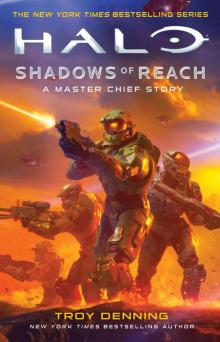 Shadows of Reach: A Master Chief Story
Shadows of Reach: A Master Chief Story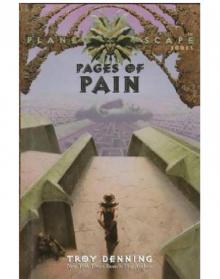 Pages of Pain p-1
Pages of Pain p-1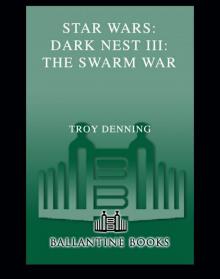 Star Wars 396 - The Dark Nest Trilogy III - The Swarm War
Star Wars 396 - The Dark Nest Trilogy III - The Swarm War Star Wars: Fate of the Jedi: Apocalypse
Star Wars: Fate of the Jedi: Apocalypse A Forest Apart
A Forest Apart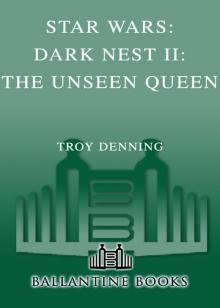 Star Wars: Dark Nest II: The Unseen Queen
Star Wars: Dark Nest II: The Unseen Queen Star Wars: A Forest Apart
Star Wars: A Forest Apart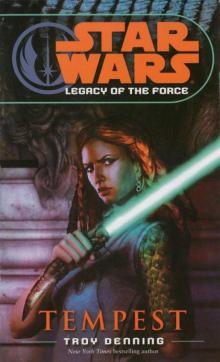 Tempest: Star Wars (Legacy of the Force) (Star Wars: Legacy of the Force)
Tempest: Star Wars (Legacy of the Force) (Star Wars: Legacy of the Force) Star by Star
Star by Star Crucible: Star Wars
Crucible: Star Wars Last Light
Last Light Invincible
Invincible Inferno
Inferno Star Wars - The Trouble With Squibs
Star Wars - The Trouble With Squibs Abyss
Abyss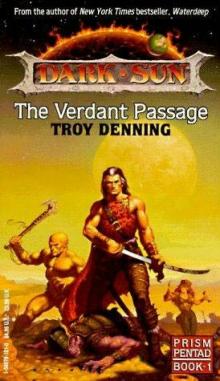 The Verdent Passage
The Verdent Passage Vortex: Star Wars (Fate of the Jedi) (Star Wars: Fate of the Jedi)
Vortex: Star Wars (Fate of the Jedi) (Star Wars: Fate of the Jedi)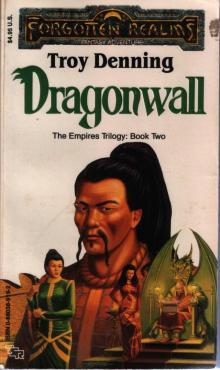 Dragonwall e-2
Dragonwall e-2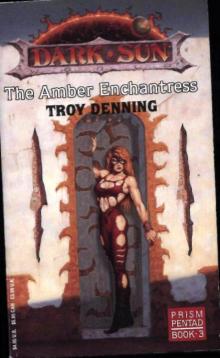 The Amber Enchantress
The Amber Enchantress Crucible
Crucible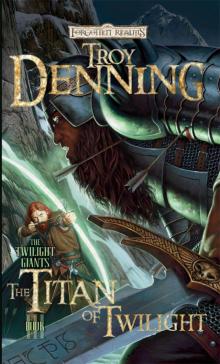 The Titan of Twilight
The Titan of Twilight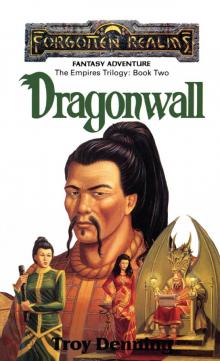 Dragonwall
Dragonwall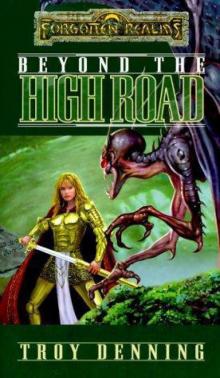 Beyond the High Road c-2
Beyond the High Road c-2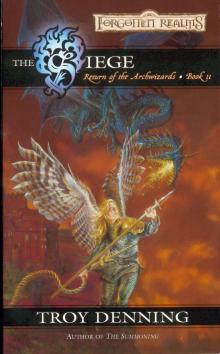 The Siege rota-2
The Siege rota-2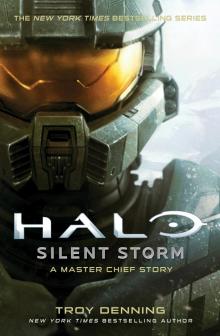 Silent Storm: A Master Chief Story
Silent Storm: A Master Chief Story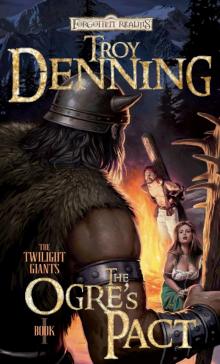 The Ogre's Pact
The Ogre's Pact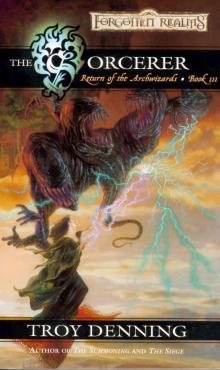 The Sorcerer rota-3
The Sorcerer rota-3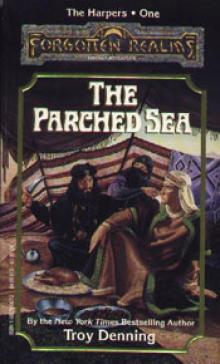 The Parched sea h-1
The Parched sea h-1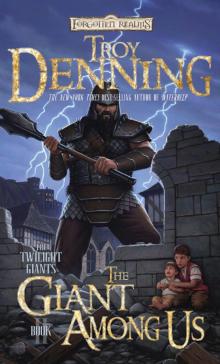 The Giant Among Us
The Giant Among Us Recovery
Recovery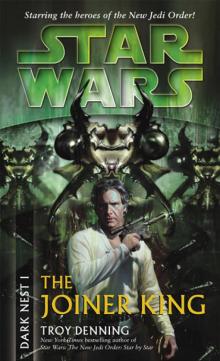 Star Wars: Dark Nest 1: The Joiner King
Star Wars: Dark Nest 1: The Joiner King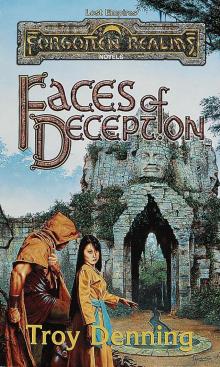 Faces of Deception le-2
Faces of Deception le-2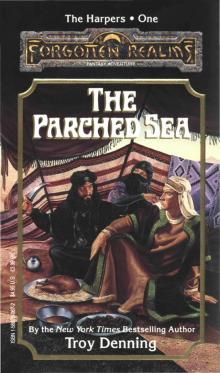 The Parched Sea
The Parched Sea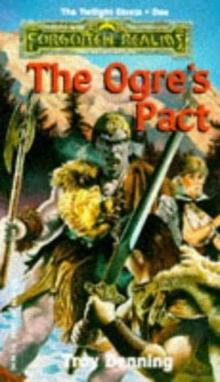 The Ogre's Pact зк-1
The Ogre's Pact зк-1 Apocalypse
Apocalypse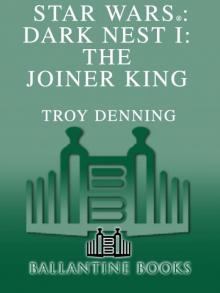 Star Wars®: Dark Nest I: The Joiner King
Star Wars®: Dark Nest I: The Joiner King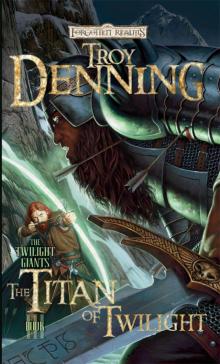 The Titan of Twilight ttg-3
The Titan of Twilight ttg-3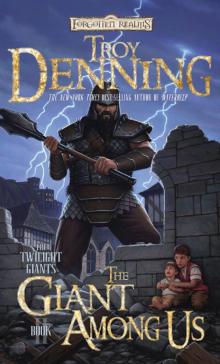 The Giant Among Us ttg-2
The Giant Among Us ttg-2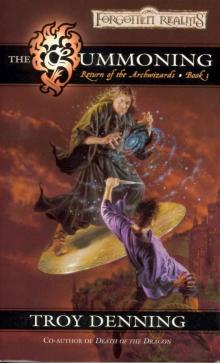 The Summoning rota-1
The Summoning rota-1 Tatooine Ghost
Tatooine Ghost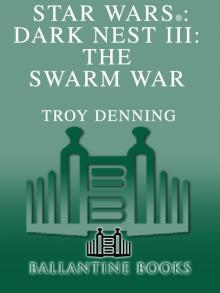 Star Wars®: Dark Nest III: The Swarm War
Star Wars®: Dark Nest III: The Swarm War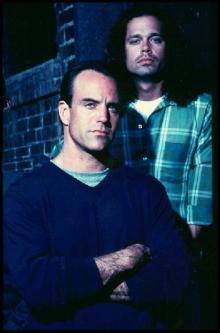 Retribution
Retribution A Forest Apart: Star Wars (Short Story)
A Forest Apart: Star Wars (Short Story)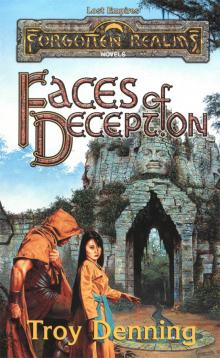 Faces of Deception
Faces of Deception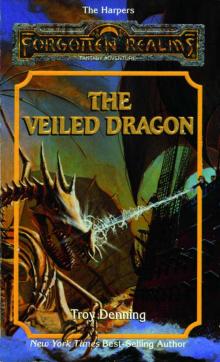 The Veiled Dragon h-12
The Veiled Dragon h-12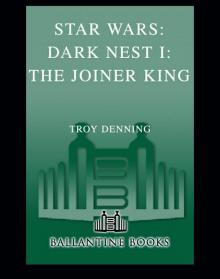 Star Wars 390 - The Dark Nest Trilogy I - The Joiner King
Star Wars 390 - The Dark Nest Trilogy I - The Joiner King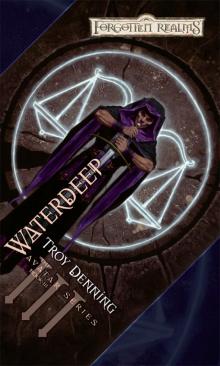 Waterdeep
Waterdeep STAR WARS: NEW JEDI ORDER: RECOVERY
STAR WARS: NEW JEDI ORDER: RECOVERY